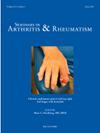The Autoantibody response in rheumatoid arthritis; what makes it unique?
IF 4.6
2区 医学
Q1 RHEUMATOLOGY
引用次数: 0
Abstract
Many autoimmune diseases respond well to therapies targeting B cells, emphasizing the importance of autoreactive B cells in disease induction and progression. In some cases, autoantibodies from plasma cells are the main effectors, while in others, memory B cells are thought to modulate inflammatory responses through antigen presentation or cytokine secretion. Tolerance mechanisms usually prevent the development of autoantibodies, but when these systems fail, autoimmunity and subsequent autoimmune diseases can arise. Understanding the dynamics of autoreactive B cell responses is crucial for delineation the pathogenic pathways underlying disease. Rheumatoid arthritis (RA) is a prototypic autoimmune disease featuring autoreactive B cell responses against post-translationally modified (PTM) proteins. Especially, the Anti-Citrullinated Protein Antibody (ACPA) response, the autoimmune response hallmarking RA, is well characterized over the last two decades. ACPA target citrullinated proteins and their presence is associated with more severe disease progression. In recent years, it has become apparent that ACPA are very promiscuous and able to recognize both human and microbial PTM proteins. Likewise, it is now clear that these antibodies often carry Fab glycans that could, potentially, boost B cell activation and/or be involved in evasion of tolerance mechanisms. Although subjected to tolerance checkpoint, new technologies have shown that the secreted ACPA repertoire is highly polyclonal, unique to each patient, but also dominated by a few ACPA clones.
In this synopsis, these and other findings are discussed. Overall, these shed light on the complexity and evolving nature of the ACPA response in RA, unveiling new insights into autoreactive B cell behavior.
类风湿关节炎自身抗体反应的研究是什么让它与众不同?
许多自身免疫性疾病对靶向B细胞的治疗反应良好,强调了自身反应性B细胞在疾病诱导和进展中的重要性。在某些情况下,来自浆细胞的自身抗体是主要的效应器,而在其他情况下,记忆B细胞被认为通过抗原呈递或细胞因子分泌来调节炎症反应。耐受性机制通常阻止自身抗体的产生,但当这些系统失效时,自身免疫和随后的自身免疫性疾病就会出现。了解自身反应性B细胞反应的动力学对于描述疾病的致病途径至关重要。类风湿性关节炎(RA)是一种典型的自身免疫性疾病,其特征是B细胞对翻译后修饰(PTM)蛋白的自身反应性反应。特别是抗瓜氨酸化蛋白抗体(ACPA)反应,RA的自身免疫反应标志,在过去二十年中得到了很好的表征。ACPA靶向瓜氨酸化蛋白,它们的存在与更严重的疾病进展相关。近年来,人们发现ACPA是非常混杂的,能够识别人类和微生物的PTM蛋白。同样,现在很清楚,这些抗体通常携带Fab聚糖,可能潜在地促进B细胞活化和/或参与逃避耐受机制。虽然受到耐受检查点的影响,但新技术已经表明,分泌的ACPA库是高度多克隆的,每个患者都是独特的,但也由少数ACPA克隆支配。在本摘要中,我们将讨论这些发现和其他发现。总的来说,这些揭示了RA中ACPA反应的复杂性和进化性质,揭示了对自身反应性B细胞行为的新见解。
本文章由计算机程序翻译,如有差异,请以英文原文为准。
求助全文
约1分钟内获得全文
求助全文
来源期刊
CiteScore
9.20
自引率
4.00%
发文量
176
审稿时长
46 days
期刊介绍:
Seminars in Arthritis and Rheumatism provides access to the highest-quality clinical, therapeutic and translational research about arthritis, rheumatology and musculoskeletal disorders that affect the joints and connective tissue. Each bimonthly issue includes articles giving you the latest diagnostic criteria, consensus statements, systematic reviews and meta-analyses as well as clinical and translational research studies. Read this journal for the latest groundbreaking research and to gain insights from scientists and clinicians on the management and treatment of musculoskeletal and autoimmune rheumatologic diseases. The journal is of interest to rheumatologists, orthopedic surgeons, internal medicine physicians, immunologists and specialists in bone and mineral metabolism.

 求助内容:
求助内容: 应助结果提醒方式:
应助结果提醒方式:


